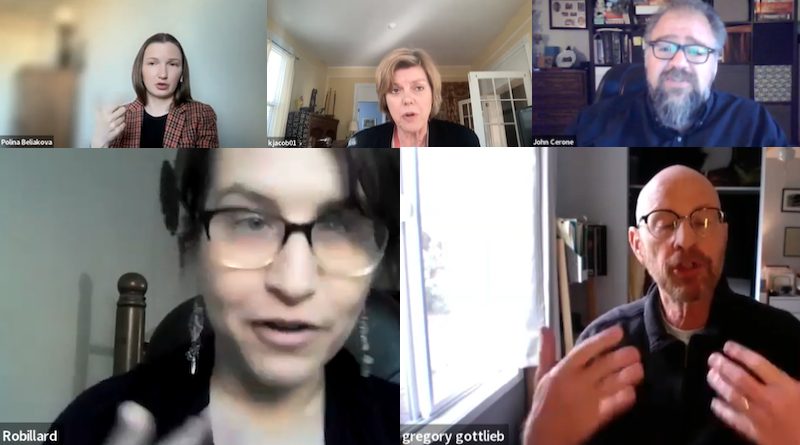The Humanitarian Crisis in Ukraine and the International Law Implications
By Alex Avaneszadeh, MALD 2023 Candidate, The Fletcher School
On April 20, 2022, The Fletcher Russia and Eurasia Program held a virtual panel discussion on the implications of the Russia-Ukraine war on international humanitarian law, human rights law, alleged war crimes committed by the Russian military, and the impact of the war on displaced Ukrainians. The conversation was chaired by Assistant Director of the Russia and Eurasia Program, Arik Burakovsky, and hosted the following speakers: Karen Jacobsen, Henry J. Leir Professor in Global Migration at The Fletcher School, Gregory Gottlieb, Visiting Fellow at the Friedman School of Nutrition Science and Policy, Polina Beliakova, Ph.D. candidate at The Fletcher School, John Cerone, Visiting Professor of International Law and The Fletcher School, and Sabina Robillard, Doctoral student at the Friedman School of Nutrition focusing on humanitarian action.
Professor Jacobsen began her opening remarks by putting the current Russia-Ukraine war in a global context, highlighting how “all of the attention of the world is now on Ukraine and that has consequences on other emergencies…all the political capital is going toward the war in Ukraine.” Having implied that without diminishing the conflict in Ukraine, the world’s attention on this singular issue does pose a risk to the intensity of conflicts increasing elsewhere.
Jacobsen then mentioned that the “history of displacement in the world shows that people who have become refugees will want to return home” and that the “resources and efforts to get the United States to resettle refugees as somewhat misguided.” As for internally displaced persons (IDPs), they generally receive far less attention than refugees and are less resourced.
“The entity responsible for IDPs is the government in addition to local organizations,” said Jacobsen, recommending that funds should be directed to the Ukrainian government in taking care of their people.
Echoing Professor Jacobsen’s opening remarks, Professor Gottlieb agreed that “despite the needs that exist with Ukrainians, it is really important to not take our eyes off the other emergencies out there because those needs are just as great and we have to try to do both.” In addition, there has been significant humanitarian relief funding coming from the United States, the European Union and the private sector amount to roughly $200 million; however, Professor Gottlieb noted that “we always want to keep in mind what the absorptive capacity of that money is because systems have to be built.”
In reference to his previous work with the humanitarian crisis in Syria, Gottlieb compares Aleppo to the decimation of Mariupol in Ukraine, having underscored that these situations are very similar and not surprising. He also emphasized that the international community needs to begin thinking about what reconstruction in Ukraine will look like “if the Russians eventually pull out.”
Shifting to the military issues on the ground, Polina Beliakova outlined how the brutality of the Russian military in cities such as Bucha is “a strategy, policy and byproduct of systemic violence in the Russian military institution.” As such, the strategy of coercion has been to target civilian populations – “not being afraid to use the word ‘genocide.’”
Ultimately, the “existence of Ukraine as a state and nation is considered by Putin to be a threat to Russian security and statehood,” added Beliakova.
Regarding the international humanitarian law implications, Professor Cerone focused primarily on targeting issues and the use of mercenaries in the war. With the president of Ukraine giving weapons to civilians, calling on them to resist, this is “blurring the lines between civilians and combatants” which creates ambiguities around targeting. In referring to the IHL principle of distinction, combatants and military objectives are targetable, but not civilians. The only time combatants are not targetable is when they’re surrendering or sick and wounded.
“In the current Ukraine situation, some civilians have become part of the armed forces, and at that point they transform from civilian to combatant and are thenceforth targetable,” said Professor Cerone.
However, in regard to civilian casualties, Cerone noted that the targeting of civilians is not unlawful if the primary target was a military objective. It is only unlawful if “the civilians are disproportionate to the value of the military objective that you’re neutralizing,” meaning that there is a calculus involved when determining the civilian-combatant death ratio in a potential attack.
For mercenaries, Cerone highlighted that the law of armed conflict does not prohibit the use of mercenaries, although there is a separate treaty banning the use of mercenaries for which Ukraine is a party and Russia is not. To be constituted as a mercenary, there must be a motivation for compensation and that “they have to be compensated more than the average member of a state’s regular armed forces.” As far as international criminal law goes, Cerone mentioned the three categories of international crimes: war crimes, crimes against humanity, and genocide; all of which are under the jurisdiction of the ICC to which Ukraine is a party. Therefore, the ICC has jurisdiction over the situation in Ukraine.
With concluding inputs from Sabina Robillard, the issue of humanitarian action was discussed, having noted that the “reality is that the first humanitarian action is always local, coming from people who are geographically and socially connected to the emergency.” This can be spontaneous volunteers, informal associations, church groups, mosques, and others who are socially connected to the emergency.
In such humanitarian crises, Robillard underscores that “it’s really important to engage with and follow the leadership of local humanitarian actors,” adding that it is “more effective, efficient, and tends to be more sustainable.”

